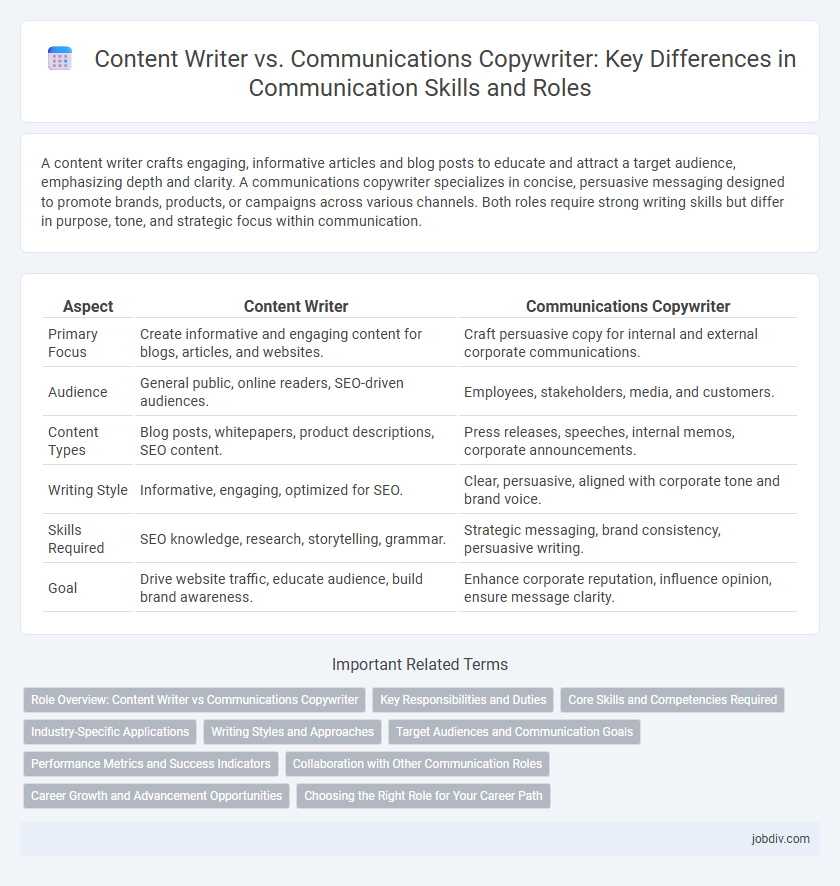A content writer crafts engaging, informative articles and blog posts to educate and attract a target audience, emphasizing depth and clarity. A communications copywriter specializes in concise, persuasive messaging designed to promote brands, products, or campaigns across various channels. Both roles require strong writing skills but differ in purpose, tone, and strategic focus within communication.
Table of Comparison
| Aspect | Content Writer | Communications Copywriter |
|---|---|---|
| Primary Focus | Create informative and engaging content for blogs, articles, and websites. | Craft persuasive copy for internal and external corporate communications. |
| Audience | General public, online readers, SEO-driven audiences. | Employees, stakeholders, media, and customers. |
| Content Types | Blog posts, whitepapers, product descriptions, SEO content. | Press releases, speeches, internal memos, corporate announcements. |
| Writing Style | Informative, engaging, optimized for SEO. | Clear, persuasive, aligned with corporate tone and brand voice. |
| Skills Required | SEO knowledge, research, storytelling, grammar. | Strategic messaging, brand consistency, persuasive writing. |
| Goal | Drive website traffic, educate audience, build brand awareness. | Enhance corporate reputation, influence opinion, ensure message clarity. |
Role Overview: Content Writer vs Communications Copywriter
Content writers specialize in creating informative, engaging, and SEO-friendly articles, blog posts, and website content aimed at attracting and educating target audiences. Communications copywriters focus on crafting persuasive and concise messages for marketing campaigns, press releases, and corporate communications to enhance brand awareness and drive consumer action. While content writers prioritize long-form, value-driven content, communications copywriters excel in concise, impactful language tailored to specific communication goals.
Key Responsibilities and Duties
Content writers research, create, and edit informative or engaging articles, blog posts, and web content aimed at attracting and retaining target audiences through SEO optimization and storytelling techniques. Communications copywriters specialize in crafting persuasive, brand-aligned messages for marketing campaigns, press releases, social media, and internal communications, ensuring consistency in tone and clarity. Both roles demand strong writing skills, but content writers prioritize audience engagement and information dissemination, while communications copywriters focus on shaping brand voice and driving action.
Core Skills and Competencies Required
Content writers excel in storytelling, SEO optimization, and research skills to create engaging, informative articles that drive web traffic and enhance brand visibility. Communications copywriters specialize in persuasive writing, audience targeting, brand voice consistency, and crafting compelling calls to action for marketing campaigns and corporate communications. Both roles require strong command of language, creativity, and adaptability, but communications copywriters demand expertise in shaping messages that influence stakeholder behavior and support strategic business goals.
Industry-Specific Applications
Content writers develop industry-specific materials such as blog posts, whitepapers, and product descriptions tailored to engage target audiences and enhance brand authority. Communications copywriters specialize in crafting concise, persuasive messages for internal communications, press releases, and marketing campaigns that align with corporate strategies. Both roles require deep understanding of industry jargon and audience needs to optimize message clarity and impact across digital and traditional platforms.
Writing Styles and Approaches
Content writers prioritize informative, SEO-driven writing that attracts and engages target audiences through well-researched articles and blog posts. Communications copywriters focus on persuasive, brand-centric messaging crafted to influence audience perception and drive specific actions across marketing channels. Writing styles differ as content writers emphasize clarity and depth, while communications copywriters prioritize emotive tone and concise calls to action.
Target Audiences and Communication Goals
Content writers primarily create informative and engaging materials tailored for broad target audiences, focusing on delivering value through educational or entertaining content. Communications copywriters craft persuasive messages aimed at specific segments, often aligning with brand strategies to influence consumer behavior and drive actions. Both roles require understanding audience demographics and communication goals but differ in their approach to tone, style, and intended impact.
Performance Metrics and Success Indicators
Content writers are evaluated primarily on engagement metrics such as average time on page, bounce rate, and organic traffic growth, reflecting their ability to generate informative and SEO-friendly content. Communications copywriters measure success through conversion rates, click-through rates (CTR), and message clarity, emphasizing persuasive language that drives action and brand alignment. Both roles rely on analytics tools like Google Analytics and A/B testing to optimize content effectiveness and meet organizational communication goals.
Collaboration with Other Communication Roles
Content writers specialize in creating informative and engaging material tailored to target audiences, while communications copywriters craft persuasive messages aligned with brand voice and marketing goals. Both roles collaborate closely with marketing strategists, graphic designers, and public relations professionals to ensure message consistency and campaign effectiveness. Effective teamwork among these communication roles enhances content quality and amplifies audience engagement across multiple channels.
Career Growth and Advancement Opportunities
Content writers often have diverse opportunities to expand into digital marketing, SEO specialization, or content strategy, providing a broad career growth trajectory with varied skill development. Communications copywriters typically advance by honing brand messaging expertise, moving into senior copywriting roles or communications management, which focus heavily on strategic communication and media relations. Both paths offer upward mobility, but the communications copywriter role frequently aligns with leadership positions in corporate communication or public relations departments.
Choosing the Right Role for Your Career Path
Content writers specialize in creating in-depth articles, blog posts, and informative materials that educate and engage audiences, focusing on SEO strategies and keyword optimization. Communications copywriters craft persuasive and concise messaging for campaigns, advertisements, and internal communications, emphasizing brand voice and audience impact. Choosing the right role depends on whether you prefer developing detailed content to inform readers or producing strategic, compelling copy to drive action and enhance brand presence.
Content Writer vs Communications Copywriter Infographic

 jobdiv.com
jobdiv.com